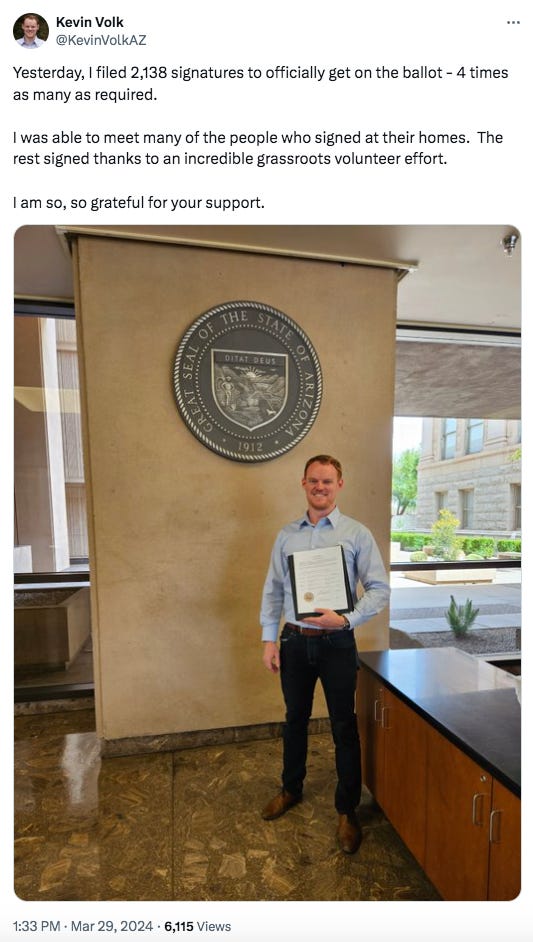The Daily Agenda: Volk wants to work with everybody
The Dem candidate in LD17 is tired of extreme politics ... He says he'd keep his head down and work ... Treasurer candidate drops out.
Kevin Volk knocked on a thousand doors over the last few months, talking to people about what they want in a state legislator and making his case to get their vote.
After wearing out a pair of shoes as he pounded the pavement, Volk turned in more than 2,000 signatures last week. It was enough to put him on the ballot as the Democratic candidate for one of the two state House seats in Legislative District 17.
That type of work ethic and willingness to talk to people from across the political spectrum was a big part of his message when he sat down with the Tucson Agenda this week to talk about why he’s running, which issues he cares about most, and what he’d like to do if elected.
“I view the job as an almost sacred responsibility for public service and representing all of your constituents, the ones who agree with you and the ones who don’t agree with you,” he said.
If voters send him to the Legislature, he would “work with anybody, Republican, Democrat, independent” on issues like the rising cost of living, reproductive rights, and the “urgent water crisis,” among others.
Before he can do that, he first has to unseat one of the two Republican representatives in LD17, first-term Reps. Rachel Jones and Cory McGarr. They’re part of the Freedom Caucus and in Volk’s view are too focused on the “extreme issues and the highly divisive partisan politics that we’ve just seen way too much of.”
Volk pointed to a proposal from Jones that would hand Arizona’s electoral college votes to the Republican presidential nominee, regardless of who voters chose.
“To me, they are demonstrably far outside of the mainstream of what Arizonans believe on issues and where the voters in Legislative District 17 are,” he said. “And that’s what makes this race competitive.”
As for Volk himself, he is a 38-year-old native Tucsonan who attended “public neighborhood schools” and then Salpointe Catholic High School. He also taught grade school in San Jose, California after he graduated from Brown University with a degree in economics.
He is an advocate for the Pima Early Education Program Scholarships, and if he were elected to the Legislature he’d try to restore funding for public schools, as well as encourage people to become teachers and stay with the career.
He works at his family’s commercial real estate brokerage in Tucson, the Volk Company, where he connects small businesses with vacant commercial properties.
One of the reasons he’s running for the Legislature is, as a small business owner, he was appalled at the “irresponsible fiscal management” that led to the state government squandering a budget surplus.
But it also was his “willingness to dig into the issues” and to stay “open minded,” two things he wasn’t seeing much of at the Legislature, that spurred him to run for office for the first time.
One of the biggest issues in Arizona right now is reproductive rights. He called them “absolutely essential” and said they were part and parcel of the individual freedom Arizonans cherish so much.
Decisions about abortion should be “informed by people’s doctors, their loved ones, and their family and friends, and not by government and politicians,” he said. “That’s the appropriate standard to set.“
Arizona’s housing shortage is another issue he’d have to deal with as a legislator. He says his job in real estate gave him “expertise” that he could apply to housing problems. (It’s a topic he could “talk about for the next five hours.”)
As a legislator, he’d look at reducing the cost of developing housing and streamline the process for projects that are approved and supported by the community.
He pointed to pre-fabricated housing as a promising way to drive down costs. A few years ago, he started a company that took used shipping containers and turned them into affordable residential units.
He’d also take a look at the investors that are buying homes, instead of Arizonans who live here. It’s a phenomenon that has “reached a level that we’ve never seen before.”
Volk doesn’t have any Democratic competitors for the House seats, so his first real election challenge won’t be until November. In the meantime, if you live in LD17, he says you should expect to meet him knocking on your door over the next few months.
This was just the first of many interviews we’ll do with local candidates. If you’re interested in hearing from them, help us stay in business by upgrading to a paid subscription!
Last two standing: Green Valley Justice of the Peace Ray Carroll is no longer in the running to replace Beth Ford as Pima County Treasurer, after withdrawing his name from consideration Wednesday, the Tucson Sentinel’s Dylan Smith writes. Ford is stepping down April 12. Supervisors will now decide whether to appoint Chris Ackerley or Patti Davidson to serve out the remainder of Ford’s term, which ends on Dec. 31. Ackerley is the current chief deputy at the Treasurer’s Office and Davidson used to hold the position. In Carroll’s letter to supervisors, he said Davidson was “highly qualified” for the position.
Signature situation: Activists hoping to get an abortion-rights initiative on the November ballot said this week they’ve collected more than 500,000 signatures, Cronkite News’ Martin Dreyfuss reports. This gives organizers a 100,000-signature cushion, with petitions still not due for another three months. The Arizona Supreme Court is expected to issue a ruling any day now on what could return state law to a near-total ban, but the Arizona Abortion Access Act would supersede any such ruling if approved by voters.
History in flux: Pima Community College’s governing board is looking for private developers to transform three vintage motels on Drachman Street, KGUN’s Andrew Christiansen reports. The board unanimously voted Wednesday night to seek out proposals about redevelopment of the Copper Cactus Inn, Frontier Motel and Tucson Inn. Board members say that by using a private developer, taxpayers won’t have to pay for the project, which is expected to take up to three years.
Safe for now: Pima County officials say the $12 million in federal funding to continue services to asylum seekers should last through August, Arizona Public Media’s Danyelle Khmara reports. The funding, which came from a recent Homeland Security appropriations bill, was announced shortly before officials were set to begin turning people away. Since 2019, the county has served more than 400,000 people through federal funding and has come close to running out of money several times.
Tradition broken: For the first time since 1915, the Sonoita Fairgrounds won’t have a racing season, after the Santa Cruz County Fair and Rodeo Association Board voted last month to cancel the 2024 Sonoita Races, Patagonia Regional Times’ Marion Vendituoli writes. The board said that the financial burden of the event, the lack of continued state funding for racing, the cancellation of racing at Tucson’s Rillito Race Track and the demise of county racing across the state all played into their decision.
Construction update: The Sonoran Corridor, a 20-mile corridor that would create a connection between Interstates 19 and 10 starting at El Toro in Sahuarita and ending at Rita Road in Tucson, is entering the next phase of planning, KOLD’s Alex Valdez reports. Officials say this phase of planning will involve nailing down the specifics of where the highway and interchanges are going while also looking at environmental and mitigation efforts. The corridor, also known as State Route 410, aims to alleviate some of the traffic in and out of Pima County.
209: The number of responses to our reader survey. Last time we checked in with you about it, on March 28, we got 19 more responses. That’s great! Every response we get helps us understand our readers a little better. If you haven’t already, take a minute and fill it out. It’s short and mostly multiple-choice questions.








